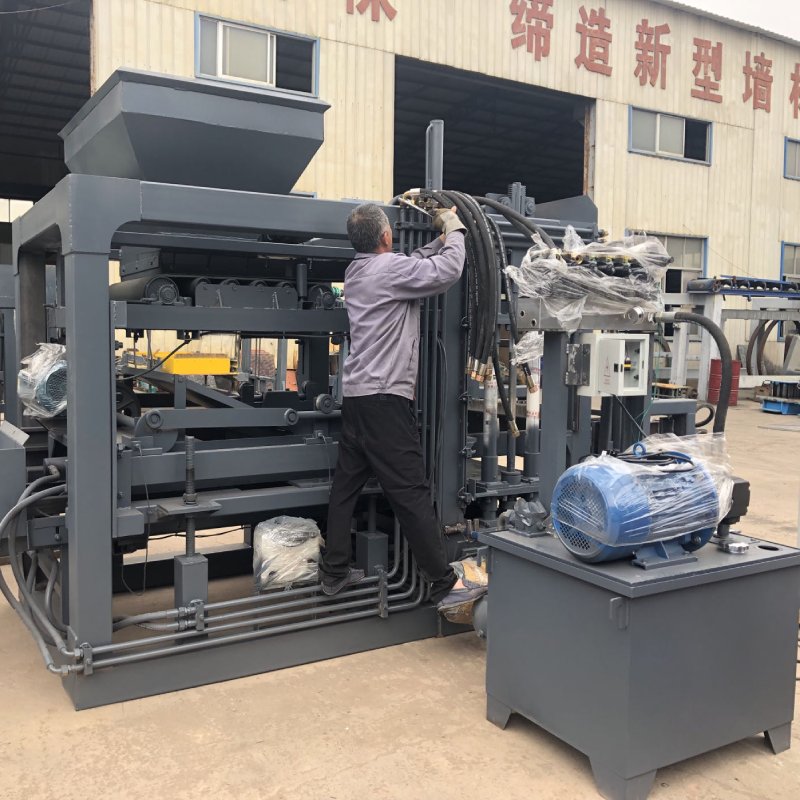
Image source Aiwei Block machine
How Brick Block Machinery is Reshaping the Industry
Introduction
The construction industry, a cornerstone of human progress, has historically relied on bricks and blocks as fundamental building materials. These unassuming components have shaped cities, homes, and infrastructure for centuries. However, the landscape of construction is changing rapidly, with technological advancements and sustainability concerns at the forefront. Brick block machinery has become a linchpin in this transformation, redefining how we build, design, and create structures. This article delves deep into the ways brick block machinery is reshaping the industry.
1. Automation and Precision Engineering
1.1. The Shift from Manual Labor
- Traditionally, brick and block production was labor-intensive.
- Automated machinery has revolutionized the process, increasing efficiency and consistency.
1.2. Computer-Controlled Precision
- Modern brick block machinery relies on computerized control systems.
- These systems ensure precise measurements, reducing waste and enhancing quality.
2. Sustainable Practices in Brick Block Machinery
2.1. Eco-Friendly Materials
- Sustainability is a driving force, with machinery manufacturers using eco-friendly materials in construction.
- Recycled and sustainable materials reduce environmental impact.
2.2. Energy Efficiency
- Advanced machinery integrates energy-efficient technologies.
- Solar-powered brick block machines offer sustainable alternatives, particularly in sunny regions.
3. The Digital Revolution in Brick Block Machinery
3.1. Real-Time Monitoring and Control
- The Internet of Things (IoT) has enabled real-time monitoring and control of machinery operations.
- Remote access allows manufacturers and operators to make adjustments as needed.
3.2. Data Analytics for Optimization
- Data collected during production is analyzed for process optimization.
- Predictive maintenance algorithms help reduce downtime and improve efficiency.
4. Modular Design and Customization
4.1. Modular Machinery
- Modern brick block machinery is modular, allowing for quick mold changes and customization.
- This flexibility accommodates various brick and block sizes, reducing downtime.
4.2. Tailored Solutions
- Some manufacturers offer customized machinery solutions tailored to specific project needs.
- Customization optimizes efficiency, reducing waste and costs.
5. Ensuring Safety in Brick Block Machinery
5.1. Safety Sensors and Systems
- Machinery is equipped with safety sensors to detect the presence of operators.
- Emergency stop systems are highly responsive, enhancing workplace safety.
5.2. Operator Training and Safety
- Virtual reality (VR) and augmented reality (AR) simulators are used for operator training.
- These technologies reduce risks associated with on-the-job learning.
6. Adherence to International Standards and Quality Assurance
6.1. ISO Certification
- Manufacturers are increasingly obtaining ISO certifications, demonstrating their commitment to quality and consistency.
- ISO standards ensure machinery meets specific performance and safety criteria.
6.2. Third-Party Validation
- Independent organizations conduct rigorous testing and certification of brick block machinery.
- Certifications verify compliance with industry standards.
7. Remote Operation and Maintenance
7.1. Remote Control Interfaces
- Operators can remotely control and monitor machinery through user-friendly interfaces.
- Remote operation enhances safety and reduces the need for on-site personnel.
7.2. Predictive Maintenance
- IoT-enabled machinery can predict maintenance needs and notify operators or service teams.
- Proactive maintenance minimizes downtime and reduces costs.
8. Environmental Impact Assessment
8.1. Environmental Regulations
- Adherence to local environmental regulations is crucial.
- Machinery should align with these regulations, especially concerning emissions and waste disposal.
8.2. Recycling and Waste Reduction
- Machinery options that minimize material waste during production are explored.
- Recycling practices for waste materials are implemented.
9. Future Prospects and Challenges
9.1. Innovations on the Horizon
- Ongoing research and development promise further advancements.
- Innovations may focus on increased automation, energy efficiency, and sustainable materials.
9.2. Challenges to Overcome
- Challenges include the need for skilled operators, adapting to evolving regulations, and addressing the energy demands of modern machinery.
Conclusion
Brick block machinery is at the forefront of the construction industry’s transformation. Its historical significance, coupled with technological advancements and sustainability initiatives, underscores its pivotal role in shaping the future of construction. Brick block machinery is not just a tool; it is a beacon of human innovation and relentless pursuit of excellence.
As we continue to build the structures of tomorrow, it is clear that brick block machinery will remain an indispensable ally, enhancing the way we construct, conserve resources, and create sustainable, enduring buildings. Embracing these innovations is crucial for architects, builders, and stakeholders looking to create a more efficient, sustainable, and environmentally responsible future in modern construction. Brick block machinery is not merely reshaping the industry; it is forging a new era of construction.
